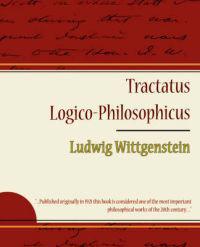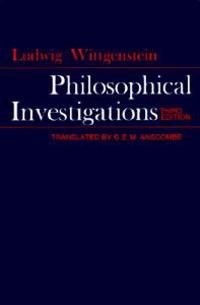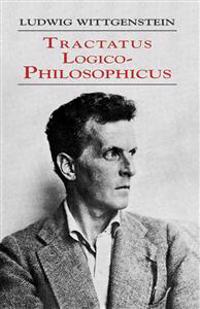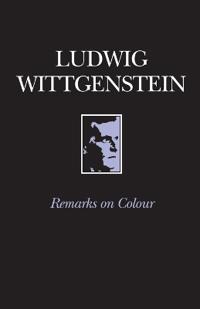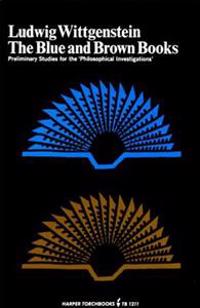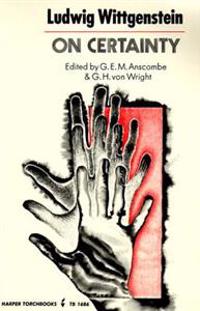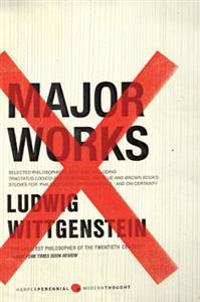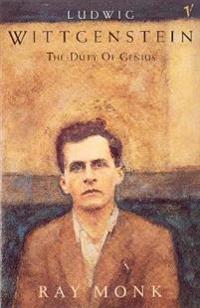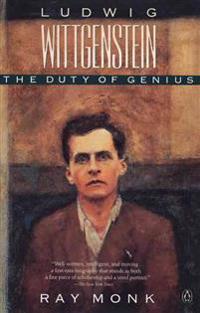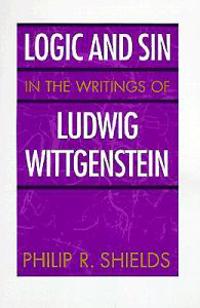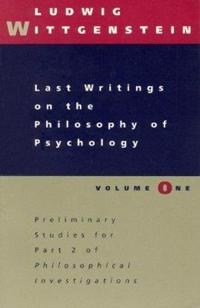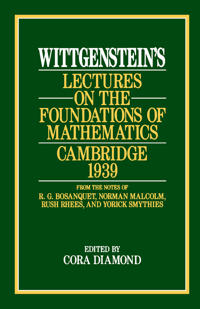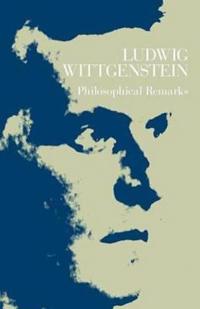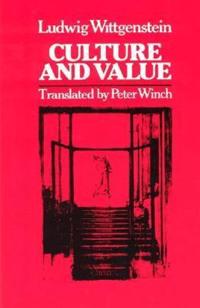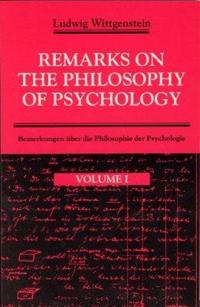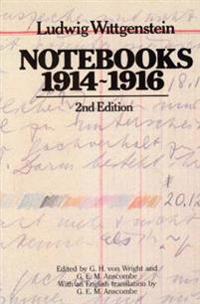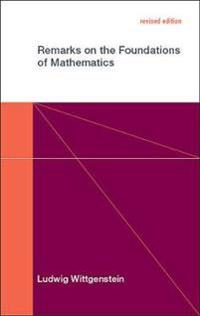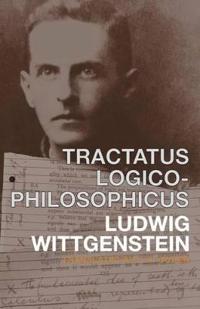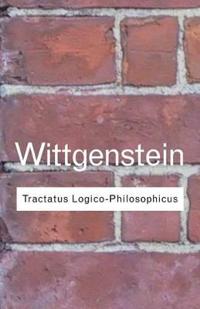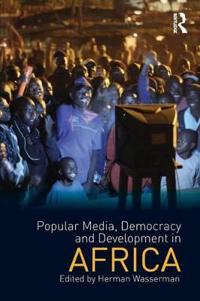Tractatus Logico-Philosophicus - Ludwig Wittgenstein (Häftad)
avLudwig Wittgenstein
ISBN: 9781604244663 - UTGIVEN: 200711Philosophical Investigations (Pocket)
avLudwig Wittgenstein, G. E. M. Anscombe, Ludwig Wittgenstein
ISBN: 9780024288103 - UTGIVEN: 1973-03One of the most influential philosophical workks of the 20th century.
Tractatus Logico-Philosophicus (Pocket)
avLudwig Wittgenstein, C. K. Ogden, Ludwig Wittgenstein
ISBN: 9780486404455 - UTGIVEN: 199801Remarks on Colour (Pocket)
avLudwig Wittgenstein, G. E. M. (EDT) Anscombe, Ludwig Wittgenstein
ISBN: 9780631116417 - UTGIVEN: 2003-08The Ordinary Route (Häftad)
avLudwig Wittgenstein
ISBN: 9780061312113 - UTGIVEN: 195801These works, as the sub-title makes clear, are unfinished sketches for Philosophical Investigations, possibly the most important and influential philosophical work of modern times. The 'Blue Book' is a set of notes dictated to Witgenstein's Cambridge students in 1933-1934: the 'Brown Book' was a dra[...]
On Certainty (Häftad)
avLudwig Wittgenstein
ISBN: 9780061316869 - UTGIVEN: 197209Written over the last 18 months of his life and inspired by his interest in G. E. Moore's defense of common sense, this much discussed volume collects Wittgenstein's reflections on knowledge and certainty, on what it is to know a proposition for sure.[...]
Major Works: Selected Philosophical Writings (Häftad)
avLudwig Wittgenstein
ISBN: 9780061550249 - UTGIVEN: 200903Major Works is the finest single-volume anthology of influential philosopher Ludwig Wittgenstein's important writings. Featuring the complete texts of Tractatus Logico-Philosophicus, The Blue and Brown Books: Studies for 'Philosophical Investigations, ' and On Certainty, this new collection selects [...]
Ludwig Wittgenstein (Häftad)
avRay Monk
ISBN: 9780099883708 - UTGIVEN: 199109In this biography of Wittgenstein, the author interleaves the philosophical and emotional aspects of his subject's life.[...]
Ludwig Wittgenstein: The Duty of Genius (Häftad)
avRay Monk
ISBN: 9780140159950 - UTGIVEN: 199111"Great philosophical biographies can be counted on one hand. Monk's life of Wittgenstein is such a one."--"The Christian Science Monitor."[...]
Ludwig Wittgenstein
ISBN: 9780190873998 - UTGIVEN: 2018-10After his intellectual biography of Saint Augustine of Hippo, Miles Hollingworth now turns his attention to one of Augustine's greatest modern admirers: The Austrian philosopher Ludwig Wittgenstein. Wittgenstein's influence on post-war philosophical investigation has been pervasive, while his eccent[...]
Ludwig Wittgenstein
ISBN: 9780199247592 - UTGIVEN: 2001-10This memoir of Ludwig Wittgenstein was written by his friend Norman Malcolm in 1958. This edition includes the complete text of the 57 letters which Wittgenstein wrote to Malcolm over a period of 11 years. The letters give an insight into how much friendships mattered to Wittgenstein.[...]
Logic and Sin in the Writings of Ludwig Wittgenstein (Häftad)
avPhilip R. Shields
ISBN: 9780226753027 - UTGIVEN: 199802This study seeks to demonstrate that ethical and religious concerns inform even the most technical writings on logic and language, and that, for Wittgenstein, the need to establish clear limitations is both a logical and an ethical demand. Rather than merely saying specific things about theology and[...]
Last Writings on the Philosophy of Psychology (Pocket)
avLudwig Wittgenstein, G. H. Von (EDT) Wright, Heikki (EDT) Nyman
ISBN: 9780226904252 - UTGIVEN: 1996-07This bilingual volume - English and German on facing pages - brings together the writings Wittgenstein composed during his stay in Dublin between October 1948 and March 1949, one of his most fruitful periods. He later drew more than half of his remarks for Part II of "Philosophical Investigations" f[...]
Lectures on the Foundations of Mathematics (Häftad)
avLudwig Wittgenstein
ISBN: 9780226904269 - UTGIVEN: 198910From his return to Cambridge in 1929 to his death in 1951, Wittgenstein influenced philosophy almost exclusively through teaching and discussion. These lecture notes indicate what he considered to be salient features of his thinking in this period of his life.[...]
Philosophical Remarks (Häftad)
avLudwig Wittgenstein
ISBN: 9780226904313 - UTGIVEN: 1980-10When in May 1930, the Council of Trinity College, Cambridge, had to decide whether to renew Wittgenstein's research grant, it turned to Bertrand Russell for an assessment of the work Wittgenstein had been doing over the past year. His verdict: "The theories contained in this new work... are novel, v[...]
Culture and Value (Pocket)
avLudwig Wittgenstein
ISBN: 9780226904351 - UTGIVEN: 198401Culture and value are the essential concerns of these remarks, hitherto available only in German as "Vermischte Bemerkungen." Although the passages date from various periods of Wittgenstein's life, over half were written during his later years, and this edition adds material probably written in 1944[...]
Remarks on the Philosophy of Psychology (Pocket)
avLudwig Wittgenstein
ISBN: 9780226904368 - UTGIVEN: 1989-01Wittgenstein finished part I of the "Philosophical Investigations" in the spring of 1945. From 1946 to 1949 he worked on the philosophy of psychology almost without interruption. The present two-volume work comprises many of his writings over this period. Though some of these remarks appeared in vol[...]
Remarks on the Philosophy of Psychology (Pocket)
avLudwig Wittgenstein
ISBN: 9780226904375 - UTGIVEN: 1988-10Wittgenstein finished part I of the "Philosophical Investigations" in the spring of 1945. From 1946 to 1949 he worked on the philosophy of psychology almost without interruption. The present two-volume work comprises many of his writings over the period. Though some of these remarks appeared in volu[...]
Notebooks, 1914-1916 (Häftad)
avLudwig Wittgenstein, G. E. Anscombe, Georg Henrik Von Wright
ISBN: 9780226904474 - UTGIVEN: 198401This considerably revised second edition of Wittgenstein's 1914-16 notebooks contains a new appendix with photographs of Wittgenstein's original work, a new preface by Elizabeth Anscombe, and a useful index by E.D. Klemke. Corrections have been made throughout the text, and notes have been added, ma[...]
Remarks on the Foundations of Mathematics (Häftad)
avLudwig Wittgenstein
ISBN: 9780262730679 - UTGIVEN: 198301Wittgenstein's work remains, undeniably, now, that off one of those few philosophers who will be read by all future generations.[...]
Tractatus Logico-Philosophicus (Häftad)
avLudwig Wittgenstein
ISBN: 9780415051866 - UTGIVEN: 198109The Tractatus Logico-Philosophicus first appeared in 1921 and was the only philosophical work that Ludwig Wittgenstein (1889-1951) published during his lifetime. Written in short, carefully numbered paragraphs of extreme compression and brilliance, it immediately convinced many of its readers and ca[...]
Tractatus Logico-Philosophicus (Häftad)
avLudwig Wittgenstein
ISBN: 9780415254083 - UTGIVEN: 200105Perhaps the most important work of philosophy written in the twentieth century, Tractatus Logico-Philosophicus was the only philosophical work that Ludwig Wittgenstein published during his lifetime. Written in short, carefully numbered paragraphs of extreme brilliance, it captured the imagination of[...]
Popular Media, Democracy and Development in Africa (Storpocket)
avLudwig Wittgenstein
ISBN: 9780415577946 - UTGIVEN: 201009Popular Media, Democracy and Development in Africa examines the role that popular media could play to encourage political debate, provide information for development, or critique the very definitions of 'democracy' and 'development'. Drawing on diverse case studies from various regions of the Africa[...]
Tractatus Logico-Philosophicus (Häftad)
avLudwig Wittgenstein
ISBN: 9780415854757 - UTGIVEN: 2013-07Ludwig Wittgenstein is one of the greatest and most fascinating philosophers of all time. His Tractatus Logico-Philosophicus, composed in a series of remarkable numbered propositions, was the only book he published in his lifetime. He tackles nothing less than the question of whether there is such a[...]

